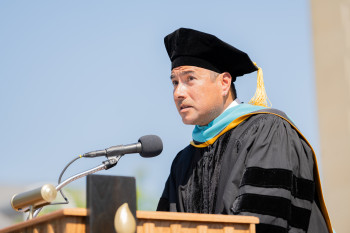Daniel Mendoza ’01 awarded honorary doctorate
 Daniel Mendoza ‘01 slept through most of his commencement ceremony 23 years ago.
Daniel Mendoza ‘01 slept through most of his commencement ceremony 23 years ago.
“And no, it was not because I partied too hard the night before,” he clarified to DePauw’s class of 2024, during their own commencement ceremony on May 19. “It was because I was trying to juggle way too much in those last few days” – wrapping up finals, preparing for graduate school, working a job, training as a competitive cyclist, and of course saying goodbye to a long list of people and places at DePauw.
Mendoza summarized the experience in two words that many DePauw students over the years have been able to relate to: overextended and overcommitted.
But despite the negative connotations of these terms, Mendoza is quick to point out their benefits. His success as a professor, scientist, and advocate for public health has its foundation in a liberal arts background that was as broad and diverse as his interests. “One thing I always like to mention when I’m discussing my DePauw education is that I learned how to learn,” he says. “We were taught to approach problems from many different angles.”
This was a skill that paid off as a graduate student at Purdue University, where Mendoza earned an M.S. in physics and a Ph.D. in earth and atmospheric science.
“I’ll be the first to admit that when I went to graduate school, I struggled.” Initially, he felt behind many of his peers who had been in universities where they had focused on a specific topic. “However, once I caught up and got to the stage where it was time to be creative and come up with new solutions, that was the easy part for me. That was the fun part. Whereas others encountered roadblock after roadblock, I saw it as an opportunity to advance.”
Mendoza still has several irons in the fire. His titles at the University of Utah reveal as much: Research Assistant Professor of Atmospheric Sciences, Adjunct Assistant Professor of Internal Medicine, and Adjunct Instructor of City & Metropolitan Planning.
His work is multidisciplinary and far-reaching. In addition to studying how environmental factors lead to negative health outcomes and economic inequality, Mendoza also advises state policymakers and seeks protection for vulnerable populations through legislative action. “I don’t want my work to just end in some scientific journal, or even in a class or a textbook,” he admits. “I want to ensure that it helps people.”
DePauw University formally recognized Mendoza’s commitment to enriching the lives of others by granting him an honorary Doctor of Public Service degree during the 2024 commencement ceremony.
In her remarks, President Lori White praised Mendoza as a worthy ambassador of the entire university. “Through both scholarship and advocacy, you have become a dynamic catalyst for a healthier and more equitable world,” she said. “Your DePauw community celebrates the manner in which you have upheld the very best of our academic and ethical ideals.”
In response, Mendoza – who was fully awake this time around – gave the newest class of overextended and overcommitted graduates a hopeful perspective on the foundation their education has given them.
“Here’s something you may not notice when you start your next adventure,” he told them. “You may not at first be the best computer scientist, you may not at first be the best writer, or grad student, or whatever it is you decide to do. But you, the class of 2024, have been well-prepared by DePauw to become the best.”
Browse other stories
-
Athletics
-
Women's Swimming & Diving - DePauw Women Recognized as a Spring 2025 Scholar All-America Team; Three Tigers Recognized
-
Men's Swimming & Diving - DePauw Men Recognized as a Spring 2025 Scholar All-America Team
-
Men's Basketball - Tigers Earn NABC Team Academic Excellence Award; Four Student-Athletes Named to Honor Court
More Athletics
-
-
News
-
National grant supports DePauw’s commitment to civil dialogue
-
Outstanding scholars named to Spring 2025 Dean's List
-
Alumni News Roundup - June 6, 2025
More News
-
-
People & Profiles
-
11 alums make list of influential Hoosiers
-
DePauw welcomes Dr. Manal Shalaby as Fulbright Scholar-in-Residence
-
DePauw Names New Vice President for Communications and Strategy and Chief of Staff
More People & Profiles
-
-
Have a story idea?
Whether we are writing about the intellectual challenge of our classrooms, a campus life that builds leadership, incredible faculty achievements or the seemingly endless stories of alumni success, we think DePauw has some fun stories to tell.
-
Communications & Marketing
101 E. Seminary St.
Greencastle, IN, 46135-0037
communicate@depauw.eduNews and Media
-
News media: For help with a story, contact:
Bob Weaver, Senior Director of Communications.
bobweaver@depauw.edu.